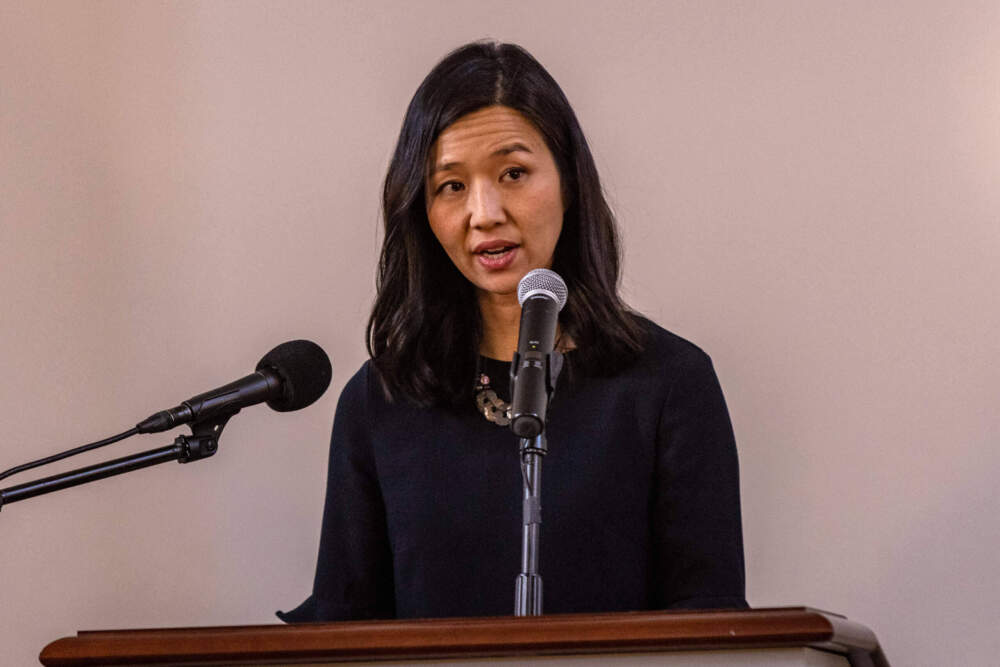Advertisement
Wu disappointed with state plan to use Roxbury recreational complex as overflow shelter

Boston Mayor Michelle Wu expressed disappointment over the state's proposal to use the Melnea A. Cass Recreational Complex in Roxbury as an overflow shelter site during a Monday appearance on WBUR's Radio Boston. The location would help temporarily house the region's homeless and migrant populations.
“I’ll just start by saying there are no good options,” Wu said when asked about her reaction to Gov. Maura Healey's proposal. The year-round recreation center would be used to give migrant and unhoused families a place to sleep overnight, out of the cold. The state has opened three overflow sites in Quincy, Revere and Cambridge since December.
"We spent several hours yesterday (Sunday) meeting at the city level, just to be prepared in case this decision is made to move forward as soon as this week," said Wu.
The mayor said that the influx of migrants into states and cities across the country is a "federal problem," and that "the governor has been doing her very best to manage this," but went on to expresses disappointment over the Healey administration's decision to turn to Roxbury for Boston's first overflow shelter given the predominantly Black neighborhood's history of economic struggle.
"For the first community where this is being proposed to be Roxbury, a community that over so many decades has faced disinvestment, redlining, disproportionate outcomes. It's very painful, and it's painfully familiar," Wu said.
She noted that the complex has an indoor track, which is used by older community members for exercise and houses track programs for youth, which her own children have participated in. These objections also were voiced by community members at a listening session held by state and local elected officials Friday to hear responses to the proposal.
"It feels like a particular inflection point when we are now taking offline buildings that are beloved and well used and dedicated to community programming because we now have such a crisis," Wu said.
Advertisement
But Wu said her hands are tied because it's a state-owned facility and the state has the final say in how it is used. She said residents expressed concern that if the site is used for a shelter, that the conversion be temporary, as the center's use increases in the summer.
“We are working with the state to try to identify every other option,” Wu said.
The city and state did tour other locations and vacant properties but nothing was ready to go according to the state's needs, she said, adding that the city did a similar tour earlier in her administration.
"We had already evaluated every possible vacant city building piece of land property that was available in order to try to carve out as much low-threshold housing to accommodate the part of the housing crisis that we were most directly responsible for, which was around unsheltered individuals," said Wu.
The mayor said the use of the recreational complex as an overflow site could begin as soon as Wednesday, and that city stakeholders met for "several hours" to discuss how they will handle impacts at the site, including increased foot traffic, keeping streets clear and finding new homes for recreation programs that are usually held there.
The proposed overflow site comes as the city sees the number of families on the waitlist for emergency shelter continuing to grow. As of Friday, 650 families were on the state waitlist and some families had taken to sleeping in Logan Airport for shelter. The strain is also being felt in Boston, Wu said, where 25% of spots in city shelters — either directly run by the city or through community partners — are now held by individuals who are newly arrived.
Wu also gave an update on city efforts to convert office spaces into housing, her push to continue with fare-free bus trips on three MBTA bus lines, and her new social media campaign to shadow Boston residents on their commutes to work.
This article was originally published on January 29, 2024.
This segment aired on January 29, 2024.


